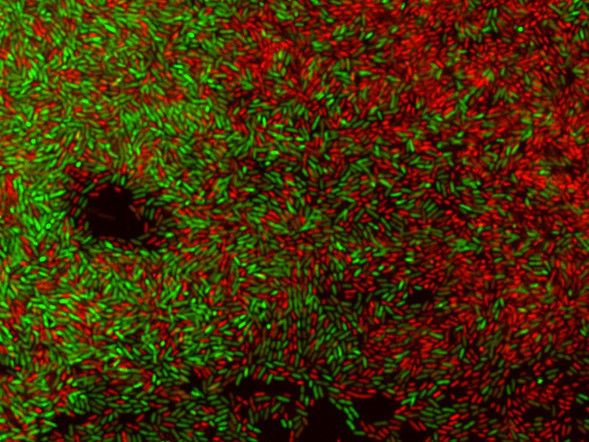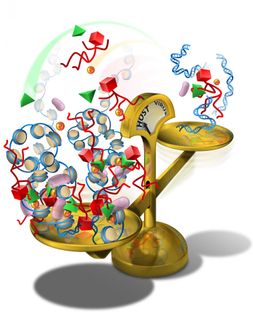How oxygen radicals protect against cancer
Originally, oxygen radicals were considered to be exclusively harmful in the body
oxygen radicals in the body are generally considered dangerous because they can trigger something called oxidative stress, which is associated with the development of many chronic diseases such as cancer and cardiovascular disease. In studies on mice, scientists at Goethe University Frankfurt have now discovered how oxygen radicals, conversely, can also reduce the risk of cancer and mitigate damage to the hereditary molecule DNA.

Symbolic image
pixabay.com
Originally, oxygen radicals - reactive oxygen species, or ROS for short - were considered to be exclusively harmful in the body. They are produced, for example, by smoking or UV radiation. Because of their high reactivity, they can damage many important molecules in cells, including the hereditary molecule DNA. As a result, there is a risk of inflammatory reactions and the degeneration of affected cells into cancer cells.
Because of their damaging effect, however, ROS are also deliberately produced by the body, for example by immune or lung epithelial cells, which destroy invading bacteria and viruses with ROS. This requires relatively high ROS concentrations. In low concentrations, on the other hand, ROS play an important role as signalling molecules. For these tasks, ROS are specifically produced by a whole group of enzymes. One representative of this group of enzymes is Nox4, which continuously produces small amounts of H2O2. Nox4 is found in almost all body cells, where its product H2O2 maintains a large number of specialised signaling functions, contributing, for example, to the inhibition of inflammatory reactions.
Researchers at Goethe University Frankfurt, led by Professor Katrin Schröder, have now discovered that by producing H2O2, Nox4 can even prevent the development of cancer. They examined mice that were unable to produce Nox4 due to a genetic modification. When these mice were exposed to a carcinogenic environmental toxin (cancerogen), the probability that they would develop a tumour doubled. Since the mice suffered from very different types of tumours such as skin sarcomas and colon carcinomas, the researchers suspected that Nox4 has a fundamental influence on cellular health.
Molecular investigations showed that the H2O2 formed by Nox4 keeps a cascade going that prevents certain important signalling proteins (phosphatases) from entering the cell nucleus. If Nox4 and consequently H2O2 are absent, those signalling proteins migrate into the cell nucleus and as a consequence, severe DNA damage is hardly recognised.
Severe DNA damage - e.g. double strand breaks - occurs somewhere in the body every day. Cells react very sensitively to such DNA damage, setting a whole repertoire of repair enzymes in motion. If this does not help, the cell activates its cell death programme - a precautionary measure of the body against cancer. When such damage goes unrecognised, as occurs in the absence of Nox4, it spurs cancer formation.
Prof. Katrin Schröder explains the research results: "If Nox4 is missing and there is therefore no H2O2, the cells no longer recognise DNA damage. Mutations accumulate and damaged cells continue to multiply. If an environmental toxin is added that massively damages the DNA, the damage is no longer recognised and repaired. The affected cells are not eliminated either, but multiply, sometimes very quickly and uncontrollably, which eventually leads to the development of tumours. A small amount of H2O2 thus maintains an internal balance in the cell that protects the cells from degeneration."
Original publication
Valeska Helfinger, Florian Freiherr von Gall, Nina Henke, Michael M. Kunze, Tobias Schmid, Flavia Rezende, Juliana Heidler, Ilka Wittig, Heinfried H. Radeke, Viola Marschall, Karen Anderson, Ajay M. Shah, Simone Fulda, Bernhard Brüne, Ralf P. Brandes, Katrin Schröder; "Genetic deletion of Nox4 enhances cancerogen-induced formation of solid tumors"; PNAS; 2021
Most read news
Original publication
Valeska Helfinger, Florian Freiherr von Gall, Nina Henke, Michael M. Kunze, Tobias Schmid, Flavia Rezende, Juliana Heidler, Ilka Wittig, Heinfried H. Radeke, Viola Marschall, Karen Anderson, Ajay M. Shah, Simone Fulda, Bernhard Brüne, Ralf P. Brandes, Katrin Schröder; "Genetic deletion of Nox4 enhances cancerogen-induced formation of solid tumors"; PNAS; 2021
Organizations
Other news from the department science

Get the life science industry in your inbox
By submitting this form you agree that LUMITOS AG will send you the newsletter(s) selected above by email. Your data will not be passed on to third parties. Your data will be stored and processed in accordance with our data protection regulations. LUMITOS may contact you by email for the purpose of advertising or market and opinion surveys. You can revoke your consent at any time without giving reasons to LUMITOS AG, Ernst-Augustin-Str. 2, 12489 Berlin, Germany or by e-mail at revoke@lumitos.com with effect for the future. In addition, each email contains a link to unsubscribe from the corresponding newsletter.
Most read news
More news from our other portals
Last viewed contents
Benoît Battistelli takes over as President of the European Patent Office
New mechanism of pancreatic cancer discovered
Unconventional natural gas wells associated with migraine, fatigue
Pieris Initiates Phase I Clinical Trial for Lead Anticalin Compound - Anti-VEGF PRS-050 is first Anticalin tested in humans
New combination therapy looks promising against ulcer bacteria
European Medicines Agency advises on compassionate use of daclatasvir - Opinion concerns use in combination with sofosbuvir in patients with chronic hepatitis C in urgent need of therapy to prevent progression of liver disease
Novartis completes shipment of US supply of Fluvirin seasonal influenza vaccine
A Change of Culture for Healthcare
Medicyte GmbH Benefits From Multi-Million Euro EU Grant VascuBone
Pneumonoultramicroscopicsilicovolcanoconiosis

Biofilms - an invisible threat to food safety - Hotspots for biofilms






















































